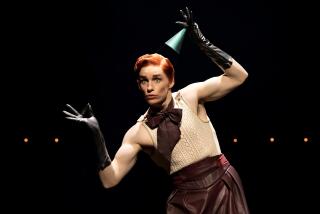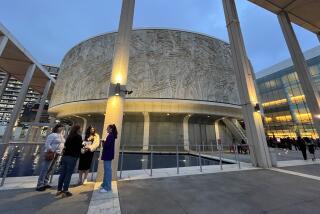Review: A revelatory Denzel Washington in ‘The Iceman Cometh’
The prospect of another long wallow in the misery of Harry Hope’s saloon should give even the most intrepid theatergoer pause.
“The Iceman Cometh,” Eugene O’Neill’s marathon drama set in 1912 before recovery became a national pastime, is an immersion in the world of sodden human wreckage. In this more or less posthumous realm, bums, tarts and bullies cling to their tattered hopes with the same death grip that they hold onto their whiskey glasses.
The new Broadway revival, directed by George C. Wolfe and starring a revelatory Denzel Washington as Hickey, a former drunk turned fanatical crusader, rises to meet the challenges of a play whose flaws are as conspicuous as its virtues. Combining high-spirited velocity with targeted psychological scrutiny, the production (at the Bernard B. Jacobs Theatre) mitigates the sluggishness of the drama while maximizing our interest in the puzzle of Hickey’s disturbingly complicated character.
One of American drama’s most intriguing case studies, Hickey is the hardware salesman who returns to his old tawdry haunt not on one of his periodic benders but on a mission to reform the resident inebriates of their belief in a better tomorrow. He’s on the wagon after the death of his wife, but he’s drunk with moral purpose to get his old friends to accept the liberating truth of their irredeemable lives.
Wolfe, keenly aware of the exhausting nature of the play, conducts the garrulous barroom banter along musical theater lines. The doleful arias, bickering duets and mocking trios are delivered at a relatively brisk tempo — a wise strategy for a work in which the small talk is circular, the gags repetitive and the grievances rehashed ad nauseam.
O’Neill is offering an American taste of what the Russian playwright Maxim Gorky accomplished in “The Lower Depths,” a descent into the desolation and despair of those society would prefer to keep out of sight. But even O’Neill’s original drama critic champions, George Jean Nathan and Stark Young, admitted that the play could benefit from judicious cutting.
The first act in this four-act drama lasts nearly an hour before Hickey makes his belated entrance. Those who bought tickets just to see Washington must be scratching their heads as one by one the drunken denizens are patiently introduced.
Wolfe drops us into the conversational stream without worrying about us taking in each and every word. The flow of talk is more meaningful than the content. The slumbering bodies are arranged in tableau fashion, as the stage directions prescribe. But the atmosphere isn’t as pronouncedly Beckettian as it was in Robert Falls’ Goodman Theatre revival with Nathan Lane that came to the Brooklyn Academy of Music in 2015.
The lighting by Jules Fisher and Peggy Eisenhauer is at once crepuscular and stark. The alcoholic characters may view their surroundings through bleary eyes but we observe them in all their unfiltered raggedness. Santo Loquasto’s set doesn’t poeticize the ambience. Any sepia tint is exposed for what it is, a combination of weak bulbs and grime. The deli platter placed on the table to get around drinking regulations at this hotel-saloon is enough to put anyone off solid food for at least a week.
The performances are more stylized than the play’s setting. Wolfe’s actors are as theatrical as their self-dramatizing characters. These barflies are fabulists spinning tall tales about their own lives. The identities of the speakers are less distinctive than their exaggerated voices and ludicrous social masks, but we begin to recognize their insistent pleas and complaints as we do leitmotifs in music.
As Harry, Colm Meaney naturally makes his proprietary presence known as he flips between temper and tolerance while dealing with customers who never pay their tabs. But he’s one lost soul among many.
David Morse smoothly embodies Larry Slade, the former anarchist whose disillusionment has relegated him to being a deadened observer of the human tragicomedy. But I can’t say I have a better understanding of the character’s internal journey, a crucial pillar in the architecture of the play.
There’s something not fully excavated in the scenes between Larry and Don Parritt (played by Austin Butler like a loose electric cable shooting sparks). A desperate young man in need of paternal absolution, Don betrayed his mother, a militant anarchist once romantically linked with Larry. But Larry is too suicidally steeped in booze to dredge up sentiment he long ago lost faith in.
Morse is truthful to everything Larry utters, but he leaves blank what’s between the lines. (Brian Dennehy, a more formidable Larry in Falls’ production, exposed more of the character’s heart and mind through the lightning flashes of his acting.) O’Neill concentrates our attention on Larry’s refusal to assume the role of surrogate parent, but how this links to Larry’s rejection of Hickey’s campaign to rid the tavern castaways of their pipe dreams remains murky in a production psychologically built around Washington’s Hickey.
Fortunately, Washington’s performance supplies more than enough illuminating fire. Kevin Spacey played Hickey as a galloping showman in Howard Davies’ 1999 Broadway revival. Nathan Lane unleashed dark fury in his towering portrayal of the fast-talking salesman in Falls’ production. Washington’s Hickey is quieter and more internally bruised. Stare hard enough and you can almost catch him wincing at his own proselytizing.
Washington’s prodigious celebrity sometimes encumbers him onstage. That is not the case here. Hickey can be a showboating role, but Washington resists the temptation to exploit the theatrical occasion. He wants to understand the man and so he puts on Hickey’s cheap suit (the outfit costume designer Ann Roth provides is like an X-ray into a part-polyester soul) and assumes the character’s broken-down demeanor. The level of emotional subtlety he achieves would be just as impressive on screen.
Hickey might be the superstar of the seedy saloon, where everyone knows he’s good for countless rounds of drinks, but glamour is not a word one would use to describe Washington’s paunchy portrayal. The performance, devoid of obvious vanity, honors the character’s distracted ambivalence. Hickey, it is often forgotten, has to be dragged into the bar from outside. Once he arrives he swings into evangelical gear, but the fearful mania flashing from his eyes instantly raises suspicions about the salvation he’s peddling. Washington captures the character’s hesitancy and doubt along with his lunatic conviction.
I thought highly of the two previous productions I’ve seen of “The Iceman Cometh” but left them both feeling I needn’t ever sit through the play again. I’m not sure that I want to see a fourth revival (at least any time soon). But Washington’s deeply felt rendering of Hickey’s fourth-act confession elucidates a tragic vision more profound than the thematic chatter O’Neill stuffs into the play about pipe dreams.
The existential bleakness of “The Iceman Cometh” can seem shallow, a depressive vision that doesn’t quite convince as a philosophical worldview. The question of the vital life, the deceptive story human beings tell themselves to help them muddle through their difficult lives, is more probingly handled by Ibsen in “The Wild Duck.”
But Washington’s self-lacerating performance clarifies the way “The Iceman Cometh,” much like “Long Day’s Journey Into Night,” is about how we inevitably fail love. The fault lies not in our baffling universe but in our own conflicted natures that we hurt those we care about most.
Washington delivers from a chair Hickey’s harrowing revelation about what prompted his conversion, and the effect of his seated stillness is to draw the audience deeper into the character’s tormented inner world. The tears streaming down Washington’s face aren’t simply being shed by a man whose wife has been victimized by her loyalty. The grief is more expansive. “The Iceman Cometh” is ultimately a lament for the impoverishment of our hearts, frozen by time and the disappointment of who we turn out to be.
Follow me @charlesmcnulty
MORE THEATER:
The Times’ critic’s take on the Tony nominations
David Henry Hwang and Jeanine Tesori’s big L.A. bet
Why is an Asian cast still a radical idea for American theater?
Prolific Broadway poster artist puts five decades of designs into one book
More to Read
The biggest entertainment stories
Get our big stories about Hollywood, film, television, music, arts, culture and more right in your inbox as soon as they publish.
You may occasionally receive promotional content from the Los Angeles Times.







